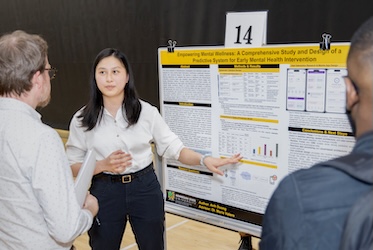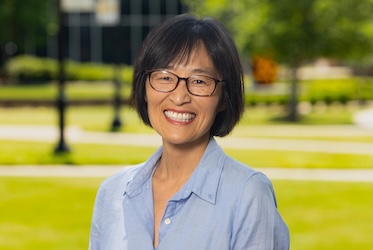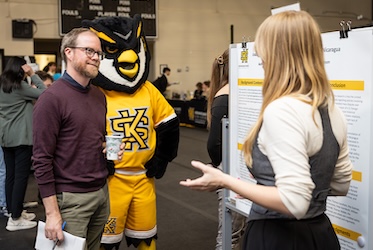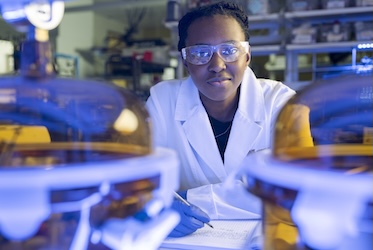
The Methods of Research
KENNESAW, Ga. | Nov 14, 2019
Bagwell College opens interactive research lab
When Iván Jorrín-Abellán began teaching at Kennesaw State University, he saw his graduate students experiencing the same frustration that his previous students in Spain had and he had in completing his own dissertation – they were struggling with what steps to take to conduct research most effectively.
“The teaching and learning of research methods is usually frightening for students and faculty, and research methods courses are the ones our students postpone until the last possible semester,” said Jorrín-Abellán, a professor of educational research. “Why is that? One plausible answer is the lack of attention and subsequent scarcity of innovation in the teaching of research methods.”
That was Jorrín-Abellán’s inspiration to establish the Interactive Research Methods Lab (IRML) in KSU’s Bagwell College of Education. The newly opened lab is an innovative space to support students and faculty as they plan and develop their research designs for their undergraduate research assignments, master capstone projects, research proposals and dissertations.
The IRML is based on the Hopscotch model, a research framework and web-based tool that Jorrín-Abellán developed in 2015. Hopscotch utilizes textual, multimedia and web resources to guide the user through a nine-step process, including the research topic and goals, the conceptual framework, research questions and design, data gathering and analysis, and the ethical principles guiding a study.
Hopscotch was received well, with thousands of people using it around world, according to Jorrín-Abellán. However, users suggested that the platform was lacking an active learning space for students to share and discuss the methodological decisions made in the nine-steps proposed by Hopscotch.
“We learned that the lack of a social learning space within it was a major limitation, particularly because of its online nature,” Jorrín-Abellán said. “In response, we developed the Interactive Research Methods Lab as a natural evolution of Hopscotch.”
Jorrín-Abellán and a team of Bagwell College colleagues established the lab, with physical space in the Bagwell Education Building and virtual space for students in online degree programs. The lab can be an asset for undergraduate and graduate students, faculty, and novice researchers to generate methodologically sound research designs in social sciences and education, according to Jorrín-Abellán.
Olga Koz, graduate research librarian for the Bagwell College and librarian associate professor, has collaborated in the development the IRML’s accompanying website that includes related resources and a 360-degree virtual tour, replicating the experience students have in the physical lab. The lab’s physical space includes customized decals of each step of the Hopscotch model posted on dry-erase walls with AR markers embedded in the decals.
Students and faculty can point their own devices, such as cell phones or tablets, at the AR markers to respond to the question prompts that guide them through the research design process. Then copies of their research design are sent via email so they can return to their work at any time to modify it or share with collaborators.
Users can also jot notes from the information virtually obtained on the dry-erase walls of the lab and their responses to the question prompts are displayed in textual and multimedia formats on a shared “virtual” wall. The data is projected on the lab’s main screen to prompt discussion of the research design decisions being considered and made in real time.
“The IRML is one of, if not the first, lab in the U.S. to provide users with personalized instruction and practical experience in the process and strategies involved in generating research designs using multimedia and augmented reality contents,” Jorrín-Abellán said. “We will continue to improve and enhance the user experience in the lab.”
Among the first educators to benefit from the lab has been Stephanee Stephens, the director of the Bagwell College’s iTeach unit that provides consulting services and professional development training to classroom teachers. In that role, Stephens works daily with K-12 schools and districts on utilizing research-based best practices and innovative approaches to learning.
Stephens has been working in the Interactive Research Methods Lab while pursuing her doctoral degree in instructional technology. She credits the IRML, through its interactive components and accessible faculty expertise, with enabling her to create a structured plan for her dissertation and future research on the topic of personalized learning.
“This innovative and fresh approach to immersive research design is an exploration that I, as a seasoned practitioner but a skeptic novice researcher, never could have imagined,” Stephens said. “Now that I have experienced it myself, I struggle to understand how others could possibly design research without it. What an incredible and transformative opportunity this lab affords to students in the Bagwell College of Education.”
Along with Jorrín-Abellán and Koz, IRML team members include Rachel Gaines, assistant professor of educational psychology; Mei-Lin Chang, associate professor of applied quantitative research and educational analysis; Jihye Kim, assistant professor of educational research; Anete Vásquez, associate professor of curriculum and instruction; and Connie Lane, BCOE grants and special projects manager.
–– Joëlle Walls
Photography by Jason Getz
Related Stories

Passions spark innovation at Kennesaw State Symposium of Student Scholars

Kennesaw State professor earns Mid-Career Award from American Educational Research Association

Kennesaw State students to present research at Symposium of Student Scholars

Chemistry student engaged in sustainable catalyst research through Kennesaw State's First-Year Scholars program
A leader in innovative teaching and learning, Kennesaw State University offers undergraduate, graduate, and doctoral degrees to its more than 47,000 students. Kennesaw State is a member of the University System of Georgia with 11 academic colleges. The university’s vibrant campus culture, diverse population, strong global ties, and entrepreneurial spirit draw students from throughout the country and the world. Kennesaw State is a Carnegie-designated doctoral research institution (R2), placing it among an elite group of only 8 percent of U.S. colleges and universities with an R1 or R2 status. For more information, visit kennesaw.edu.

















